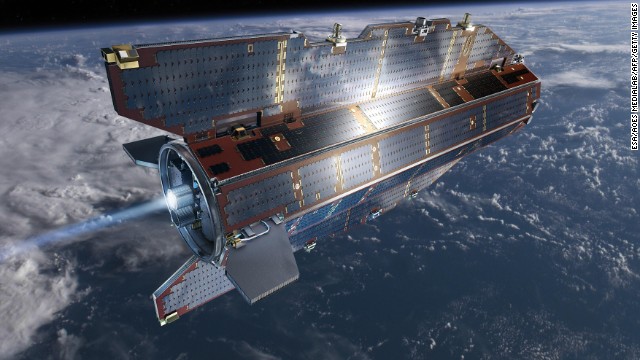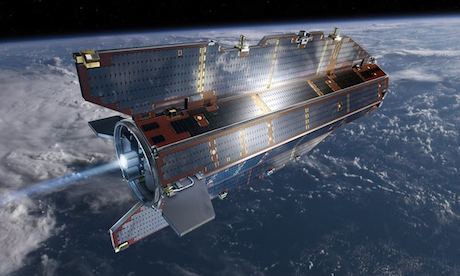Published on Nov 8, 2013
The GOCE Ran out of fuel on Oct.21st, They predict it to fall within 3 days!
http://www.cnn.com/2013/11/07/world/s...
http://www.n2yo.com/satellite/?s=34602
http://www.n2yo.com/?s=34602
http://www.n2yo.com/passes/?s=34602
..........
Satellite falling to Earth

Satellite will fall back to Earth, but where?
STORY HIGHLIGHTS
- Nobody knows where or when fragments will strike Earth
- Pieces most likely to hit oceans and unpopulated areas
- European Space Agency launched satellite in 2009
(CNN)
-- A European satellite that ran out of fuel will start falling in the
next few days, and fragments of the disintegrating 2,000-pound
spacecraft are expected to strike the Earth's surface.
Nobody
knows where or when the fragments will hit, but the European Space
Agency has said the parts are likely to fall into the ocean or
unpopulated areas. Potential spots will be narrowed down closer to
re-entry, ESA said on its website.
Re-entry
probably will occur Sunday or Monday, Rune Floberghagen, mission
manager for the Gravity Field and Steady-State Ocean Explorer, better
known as GOCE, told the New York Times.
GOCE
was launched in 2009 to map variations in the Earth's gravity in 3D,
provide ocean circulation patterns and make other measurements.
Read More and Watch Video Here
..........
European GOCE satellite falling to Earth – stay calm
The European GOCE satellite is falling uncontrollably to Earth but no one need worry too much

The European Space Agency's GOCE satellite is falling back to Earth. Photograph: ESA/AOES Medialab A
one-tonne satellite is falling uncontrollably towards the Earth. It is
expected to hit sometime late this weekend or early next week. No one
knows exactly when or where it will smash down but it is likely to
fragment into 25-45 pieces en route.
Written in those terms it
sounds like pretty scary stuff, and indeed the news is making headlines
across the web. Many seem to have been triggered by a piece in the New
York Times, titled Satellite Will Fall to Earth, But No One Is Sure Where.
Perhaps a more sensible headline would have been Satellite Will Fall to Earth, But No One Need Worry Too Much.
The spacecraft in question is the European Space Agency's Gravity field and steady-state Ocean Circulation Explorer (GOCE) mission. Since 2009, GOCE has been measuring the Earth's gravitational field with exquisite sensitivity.
Read More Here
..........












Comments
Way too logical, and common sense too! ;-)
Hopefully it will, but as you say they don't know for sure. You would think that they would know when satellite would be low on fuel so they could move it to a trajectory that would ensure a safe re-entry. But I suppose that would be too logical :S
"Probably" fall in the ocean and unpopulated areas gives me lots of comfort, seeing how they don't know for sure.